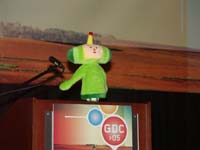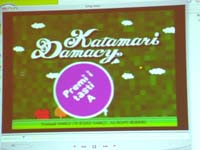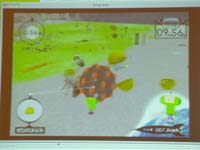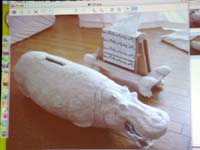|
Keita's Talk - GDC 05 Images from ImpressGameWatch Japan |
back |
||
 |
 |
 |
|
Keita started the talk
with a bang - putting his companion prince puppet up on the podium. In the QA session, someone asked if it was for sale. "No," he replied."I am not selling them."
|
||
 |
 |
|
|
After all this he
discussed his history at Namco, explaining that his first few years
were not very successful. He worked on several projects but none of
them were hits - and a few were cancelled. Bummed out, he began to
wonder about his career and look for other projects. But he couldn't
find any! What if he was fired??
|
||
 |
 |
|
|
In addition to talking
about the gameplay in Katamari, he gives some background on the
inspiration for his game - including a Japanese
school game that involves pushing large balls around. Speaking with a friend
later, she explained that indeed, the first time she played, she
immediately remembered playing this game in school, where you roll the
giant ball (for exercise and coordination, I'm guessing).
|
||
 |
 |
 |
|
Why did Keita want to make games at all, given how difficult it was? These slides are actually photos of his work in school. He studied to be a sculptor and made a lot of strange things - things that required interaction, and relied on humor. The first is a coffee table that transforms into a robot - tho it takes 2 to make the magic happen. The second was a hippo (we discussed this when I visited with him in Japan) that "disguised" tissues (if I'm not mistaken, this revolves around a play on words between "hippo" and "tisue"). It is so big that you can fit 4 boxes of tisues in it! Some disguise!!!
|
||
 |
 |
 |
|
The last thing he showed
was a flowerpot goat. Water came out of its utters when the plants
were sprinkled... again, a funny joke that commented on the way
sculpture was used to contain or shape our experience of the world.
But what good did it do?
|
||
 |
 |
 |
|
The philosophical connections between art and commerce are always hard to navigate - creator or not. I found Keita's sentiments about these subjects extremely moving. He admitted that he really doesn't play video games, and that he wonders what would happen if video games disappeared from the face of the planet. Would they really leave that much of a void? In order to have any meaning, culturally - shouldn't games be more "punk rock" or "rock and roll" - more about commentary and philosophy than distraction? If games only serve to divert us - what good are they, as art? Certainly we can do more to make them matter?
|
||
 |
||
|
Perhaps the key is to expand our audience - educate them so they demand better products? We could start, he suggested, by including novice-friendly slipcovers... manuals that people can browse before purchase. You wouldn't go into a bookstore if all the books were shrinkwrapped, right? What makes games so different? Good questions, hard questions. Hopefully he can come and speak again next year.
|
||